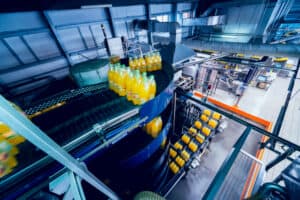
Successful food and beverage companies continually innovate and upgrade their technological infrastructure using edge computing, big data, predictive analytics, and cloud applications.
When industry experts talk about manufacturing modernizing, making use of data, and digitally transforming, most people think of companies making autos, commercial equipment, or consumer electronics. Often left out of the picture is an enormous segment of the manufacturing marketplace: the food and beverage industry. That would be a mistake.
A recent report by ResearchandMarkets.com outlines the state of technology for the food and beverage industry. The “State of Digitalization of the Food and Beverage Industry” report notes the benefits of adopting automation tools for F&B production. The report also analyzes important developing technology trends shaping the industry and identifies key competitors in the sector.
Food and Beverage embracing cutting-edge tech for efficiency, growth
The F&B manufacturing sector has embraced the Industrial Internet of Things, artificial intelligence, manufacturing execution systems, enterprise resource planning, and other cutting-edge tools to help enhance and streamline production. These tools also help them maintain quality, especially in the post-pandemic disruption. Improved business insights through real-time data processing and predictive analytics allow these companies to engage in advanced decision-making through data insights, even across a frequently disrupted supply chain.
Successful food and beverage companies continually innovate and upgrade their technological infrastructure using edge computing, big data, predictive analytics, and cloud applications. Additionally, an increase in automation driven by these technologies will improve process and product efficiency and enable new growth areas.
See also: Smart Manufacturing: Melding Digital and Physical Worlds
Strategic imperatives and growth opportunities
As opportunities expand and new business models emerge, digital technologies could help improve food production quality and enable companies to respond systematically to evolving customer demands. Three strategic imperatives drive digital technology adoption, including the difficulty of growth.
The report also outlines the impact of digitalization across the food and beverage value change, as well as what the industry may look like in the future. Technology will enable new functionalities such as intelligent traceability and may also enable companies to drive sustainability initiatives. Thanks to robotics, automation in both quality control and accuracy, and improved safety, the food and beverage industry will undergo quite a few technology upgrades that will ultimately shape its future.




























